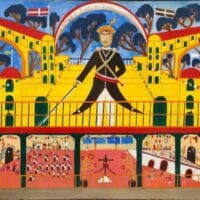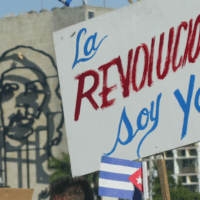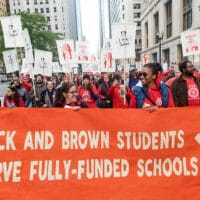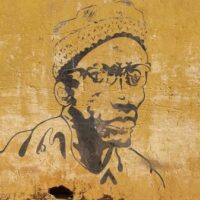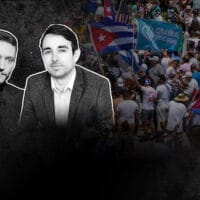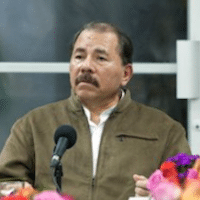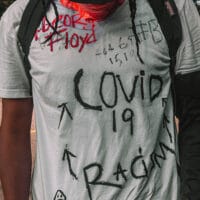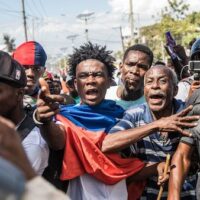-
Washington beats the drum of regime change, but Cuba responds to its own revolutionary rhythm: The Twenty-Ninth Newsletter (2021)
Four days after Moïse’s assassination, Cuba experienced a set of protests from people expressing their frustration with shortages of goods and a recent spike of COVID-19 infections.
-
Cuba: hell, purgatory and paradise
The United States was never satisfied with having lost the Cuba subjected to its ambitions. Therefore, shortly after the victory of the guerrillas of the Sierra Maestra, they tried to invade the island with mercenary troops. They were defeated in April 1961. The following year, President Kennedy decreed the blockade of Cuba, which continues to this day.
-
How labor can win at the bargaining table
A new report from Berkeley is a rare piece of good news for American labor—and a bracing reminder of what real organizing looks like.
-
Mikhail Bulgakov, “Master and Margarita” and the anti-Russian hysteria in the United States
You cannot argue with mass hypnosis. You can keep a diary, write a chronicle that reveals the falseness of the spirit of the age to hopefully enlighten future readers, because, as we hear in another of the main points of Bulgakov’s novel Master and Margarita, “manuscripts do not burn.” That is what I do….
-
Strange: challenging pandemic logics
In 2020, the U.S. government perpetually wavered in acknowledging COVID-19 as a real danger. We lived through screens, bombarded by commercial messages professing how corporations were here for us, how we were in this together, that we should be optimistic. This is strange, indeed, but to be more specific about a pandemic’s root causes would not sell products and would not reassure people to go back to normal.
-
Jack and Jill tumble: Berlin Bulletin No. 192, July 3, 2021
After legally receiving a Christmas gift of 24,000 euros from her party, Annalena Baerbock somehow neglected to report it in her tax returns. No big deal, some might think, but after the scandals about Christian Democrats nobly enriching themselves when purchasing face-masks, and two far bigger scandals hanging over the head of the Social Democrats’ chancellor candidate Scholz (currently still Finance Minister), the squeaky clean reputation of the Greens had been a major asset. No longer!
-
A third coronavirus wave is washing over the world
In countries where public health restrictions were in place, they were half-baked or have been lifted too soon. Where they are imposing them now, it’s too late; the Delta variant of the coronavirus is surging around the world.
-
How not to unite a class: a response to DSA’s Class Unity caucus
Felipe Bascuñán responds to a debate on the Left about the relationship between oppression and class and why getting the answer right is essential to forging a united class struggle.
-
Shoplifting is big news; stealing millions from workers is not
Urban crime is the golden child of local media, as recent FAIR coverage (6/21/21) has shown. But as FAIR’s Julie Hollar recently noted, the amount of attention given to a topic does not always reflect the seriousness of the situation.
-
#BetitaTaughtUs: Chicanisma and El Movimiento
With deep sadness and respect, Organizing Upgrade is sharing a few more tributes to movement elder Betita Martinez, who died June 29. In her 95 years she lived many lifetimes, and brought her commitment, wit and political clarity to several of the most significant social movements of our day.
-
Peru to officially declare Pedro Castillo as the new President
Electoral authorities concluded an electoral review in which the leftist.
-
Amílcar Cabral: Liberator, theorist, and educator
Amílcar Lopes da Costa Cabral was born September 12, 1924 in Bafatá, Guinea-Bissau, one of Portugal’s African colonies. On January 20, 1973–48 years ago today–Cabral was murdered by fascist Portuguese assassins just months before the national liberation movement in which he played a central role won the independence of Guinea-Bissau.
-
Behold: the fallacy of “techo-inevitabilism”
Director Werner Herzog’s documentary ‘Lo and Behold: Reveries of the Connected World’ (2016) begins with “Internet pioneer” Leonard Kleinrock, who welcomes us into the, yes, actual laboratory where it was “born”! To Wagnerian strains in the soundtrack, Kleinrock complacently calls the place “a holy shrine”–quite a revealing phrase for this acolyte of possibly the last of the false religions.
-
Breaking through the western media propaganda coverage of Cuba protests
While there are plenty of reasons for ordinary Cubans to currently feel disenchanted about life on the island, there are also strong suspicions that these protests were not quite the grassroots uprising they were made out to be in the U.S. press.
-
Arreaza calls cyberattack on Cuban Foreign Ministry imperial clumsiness
In his Twitter account @jaarreaza, Minister Arreaza wrote, “Another characteristic of the international incitement of aggression against #Cuba. Imperialism is clumsy enough to leave traces of its misdeeds.”
-
The bay of Tweets: documents point to U.S. hand in Cuba protests
The U.S. government can cause economic misery for the Cuban people, but it cannot, it appears, convince them to overthrow their government.
-
Pretending not to see brazen lies: the rule of law and nuclear madness
The latest brazen lie is the “rule of law” upheld by U.S. President Joe Biden at the G7 and NATO summits, especially lies about lawlessness surrounding nuclear weapons.
-
U.S. targets Nicaraguan presidential election: former solidarity activists echo imperial talking points
Now Uncle Sam has a problem in Nicaragua, where independent polls predict a landslide victory for Daniel Ortega’s leftist Sandinista slate in the November 7thpresidential elections.
-
The Bureau of Labor Statistics counted only eight strikes in 2020, Payday Report counted 1,200
In the era of COVID and digital movements, strikes look radically different from traditional labor strikes.
-
Why Human Rights in China and Tigray, But Not in Haiti, Palestine or Colombia?
Over eight days, from June 25-30, Haiti had been subjected to increasing state-sponsored, imperial and gang violence. Massacres killed almost 60 people in Port au Prince, including in Cité Soleil, Delmas and Pétionville, as well as on on Rue Magloire Ambroise.

